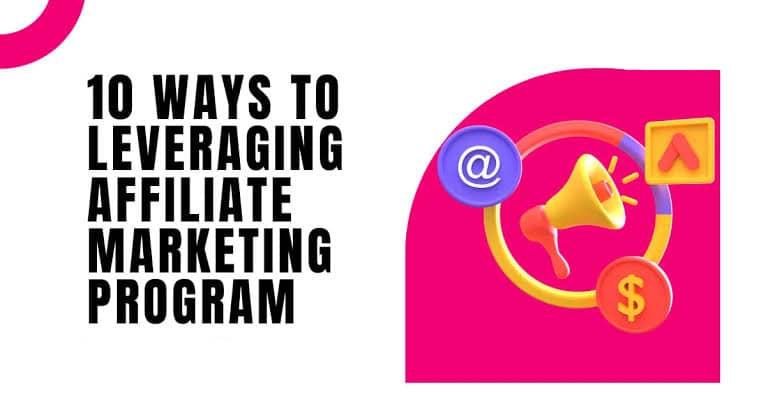Affiliate marketing terminologies refer to the specialized language used within the field of affiliate marketing. These terms are designed to communicate the various processes, roles, and components involved in this type of marketing.
Understanding these terminologies is essential for anyone participating in affiliate marketing, whether you are an affiliate marketer, a merchant, or a network. Each term holds specific meaning, enabling individuals to effectively navigate the affiliate marketing ecosystem.
This terminology not only helps define the relationships between various parties but also ensures that everyone involved understands their roles and the expectations set for their participation in the program.
At the core of affiliate marketing, the relationship between three key parties—affiliates, merchants, and consumers—is fundamental. The affiliate, also referred to as the publisher or partner, is responsible for promoting a merchant’s product or service.
The merchant, or advertiser, is the business that sells the product or service, while the consumer is the end user who purchases or engages with the merchant’s offering.
Affiliate marketing terminologies encompass various aspects of this relationship, from compensation structures to the methods of tracking and monitoring performance.
The language used in affiliate marketing reflects the dynamic and often complex nature of this business model. One key element in affiliate marketing is understanding terms related to compensation and payments.
For instance, terms like “commission” and “revenue share” are often used to define how affiliates are compensated for driving traffic or sales to a merchant’s website. Typically, the affiliate earns a commission based on a percentage of the sale price or a flat fee for each lead generated.
These terms help establish the financial aspect of affiliate marketing, which is one of the most important facets for affiliates looking to earn money through their marketing efforts.
Another significant term often encountered in affiliate marketing is “conversion.” Conversion refers to the successful completion of a desired action by a consumer, such as making a purchase, signing up for a service, or downloading a file.
The concept of conversion is at the heart of affiliate marketing because it represents the affiliate’s success in driving the desired outcome for the merchant. The term “conversion rate” is used to describe the percentage of visitors who take the desired action out of the total number of visitors.
Understanding conversion and the various metrics associated with it is essential for optimizing affiliate marketing campaigns and improving performance.
Tracking mechanisms play a crucial role in affiliate marketing, and several terms relate to this aspect of the industry. “Cookies,” for example, are small pieces of data that are stored on a user’s device when they click on an affiliate link.
Cookies allow merchants to track users’ activities across websites and ensure that the affiliate receives proper credit for sales or leads generated. Tracking cookies help monitor the user’s behavior, ensuring the correct attribution of commissions.
Similarly, “tracking links” are URLs that contain specific codes to track traffic or sales generated by affiliates. Understanding how tracking links and cookies work together is essential for affiliates to ensure that their efforts are properly recognized.
In affiliate marketing, performance is often measured through various key performance indicators (KPIs). These can include terms such as “click-through rate” (CTR), which is the ratio of users who click on an affiliate link compared to the total number of visitors.
Another important term is “cost per acquisition” (CPA), which represents the cost of acquiring a customer through affiliate marketing. These KPIs are used to evaluate the effectiveness of an affiliate’s efforts and to determine the return on investment (ROI) for both the affiliate and the merchant.
The relationship between affiliates and merchants is also governed by certain terms and conditions, which are often outlined in an affiliate program’s policies. These policies are sometimes referred to as “affiliate marketing terms and conditions.”
This refers to the set of rules that define the rights, responsibilities, and obligations of both parties involved in the affiliate marketing agreement.
These terms and conditions cover various aspects, such as how commissions are earned, the payment structure, acceptable promotional practices, and more.
The affiliate marketing terms and conditions ensure that there is a clear understanding between the affiliate and the merchant regarding the program’s expectations.
An affiliate marketing terms and conditions template is a useful tool for merchants looking to establish clear and comprehensive agreements with affiliates. This template typically includes standardized clauses that can be tailored to fit the specific needs of the affiliate program.
It helps merchants and affiliates avoid misunderstandings and ensures that both parties are on the same page regarding the terms of the partnership.
By using an affiliate marketing terms and conditions template, merchants can create a document that outlines everything from payment schedules and promotional guidelines to intellectual property rights and dispute resolution procedures.
This is an essential step in maintaining a professional and transparent relationship between merchants and their affiliates. Additionally, terms related to the promotional practices used by affiliates are vital.
“Traffic sources” and “advertising channels” are terms used to describe the different methods affiliates use to drive traffic to merchant websites. These can include paid search ads, social media platforms, email marketing, and other online marketing strategies.
Affiliates must understand how each traffic source is tracked and how it impacts their earnings. These terms also play a role in determining whether affiliates are following the terms and conditions of the program, as some affiliate programs may have specific rules about which marketing methods are acceptable.
Another important term in the world of affiliate marketing is “affiliate network.” An affiliate network acts as an intermediary between affiliates and merchants.
It provides a platform for affiliates to find products or services to promote and offers merchants a pool of affiliates to work with. The network often handles aspects such as tracking, reporting, and payments, making it easier for both merchants and affiliates to manage their partnerships.
Understanding the role of affiliate networks and the terms associated with them is crucial for those new to affiliate marketing or those looking to expand their affiliate business.
The term “affiliate marketing funnel” refers to the process through which a potential customer progresses from discovering a product or service to making a purchase. It involves multiple stages, such as awareness, consideration, and decision.
Affiliates must understand how to guide potential customers through this funnel to maximize conversions. The ability to effectively manage the affiliate marketing funnel can significantly impact an affiliate success in driving sales and generating revenue for merchants.
Read Also: How to Leverage Affiliate Marketing Through Social Media Platforms
Important Affiliate Marketing Terminologies for Successful Campaigns

Affiliate marketing is a performance-based marketing strategy where affiliates promote a merchant’s products or services and earn commissions based on sales or other actions driven by their promotional efforts.
To successfully navigate the complex world of affiliate marketing, understanding key terminologies is crucial. These terms provide structure and clarity in communication between merchants, affiliates, and affiliate networks.
The proper use and understanding of affiliate marketing terminologies are essential for ensuring that campaigns run smoothly, are transparent, and deliver results.
1. Affiliate Marketing Terminologies Overview: Affiliate marketing terminologies encompass a wide range of words and phrases that define the roles, relationships, and processes within the affiliate marketing ecosystem.
These terms help establish clear expectations and set guidelines for affiliates and merchants alike. By understanding these terms, marketers can improve their performance, track their efforts, and optimize campaigns for better outcomes.
Familiarity with affiliate marketing terminologies also enhances communication across various stakeholders, such as affiliate networks, advertisers, and publishers.
2. Affiliate: An “affiliate” is an individual or entity who promotes a merchant’s products or services in exchange for a commission. Affiliates are also referred to as publishers or partners. They are responsible for generating traffic, leads, or sales for the merchant’s offerings.
Affiliates can promote products through websites, blogs, social media, email marketing, or other online platforms. The success of an affiliate depends on their ability to effectively engage their audience and drive actions that benefit the merchant.
3. Merchant: The “merchant” is the business or company that offers products or services for sale. The merchant provides affiliates with the tools and resources needed to promote these products.
This includes affiliate links, banners, and tracking codes that affiliates use to drive sales and generate commissions. Merchants often work with affiliate networks or directly with affiliates to expand their reach and increase sales.
4. Commission: One of the most important terms in affiliate marketing is “commission.” This is the payment affiliates receive for generating a sale, lead, or other desired action. The commission is typically a percentage of the sale price but can also be a fixed amount.
The structure of commissions can vary depending on the type of affiliate program, with some programs offering recurring commissions for subscriptions or membership-based services.
5. Conversion: “Conversion” refers to the action that an affiliate marketer aims to achieve with their promotional efforts. This could be a purchase, sign-up, or any other action defined by the merchant.
“Conversion rate” is a metric used to measure the percentage of visitors who take the desired action. A higher conversion rate indicates that the affiliate’s promotional efforts are effectively engaging their audience.
6. Affiliate Link: An “affiliate link” is a unique URL provided to affiliates to track their promotional efforts. When a consumer clicks on an affiliate link and completes a desired action, the affiliate earns a commission.
The affiliate link contains tracking parameters that identify which affiliate referred the visitor, allowing the merchant to properly attribute commissions.
7. Tracking and Cookies: “Tracking” in affiliate marketing refers to the process of monitoring user actions and attributing them to the correct affiliate. This is typically done through “cookies,” which are small pieces of data stored on a user’s device when they click on an affiliate link.
Cookies help track a user’s activity, including when they make a purchase or complete a sign-up, ensuring that affiliates are credited for the actions they generate. Cookie duration is a critical factor as it determines how long the tracking lasts after a user clicks an affiliate link.
8. Affiliate Network: An “affiliate network” acts as an intermediary between merchants and affiliates. It provides a platform where affiliates can find and join affiliate programs, while merchants gain access to a pool of affiliates who can promote their products.
Affiliate networks also handle tracking, reporting, and payment processing, making it easier for both merchants and affiliates to manage their campaigns. Popular affiliate networks include Commission Junction (CJ), ShareASale, and Rakuten Marketing.
9. Cost per Acquisition (CPA): This is a key metric used to determine how much it costs to acquire a customer through affiliate marketing. It is calculated by dividing the total cost of the campaign by the number of conversions.
CPA is an important metric for affiliates and merchants alike, as it helps evaluate the profitability of affiliate marketing efforts. A lower CPA indicates a more efficient campaign.
10. Cost per Click (CPC): This is another common metric in affiliate marketing. It refers to the amount an affiliate earns each time a visitor clicks on their affiliate link, regardless of whether the visitor completes a desired action. CPC is often used in paid search campaigns or display ads, and it can help affiliates earn income even without conversions.
11. Lead Generation: Refers to the process of capturing potential customers’ information, such as names, email addresses, or phone numbers.
This is a common objective in affiliate marketing programs that focus on generating leads rather than immediate sales. Affiliates often use lead-generation forms to collect this data and earn commissions for each valid lead they submit.
12. Payment Structure: The “payment structure” defines how affiliates are compensated for their promotional efforts. There are several types of payment models, including:
a. Pay per Sale (PPS): Affiliates earn a commission when a sale is made.
b. Pay per Lead (PPL): Affiliates earn a commission when they generate a qualified lead.
c. Pay per Click (PPC): Affiliates earn a commission each time a user clicks on their affiliate link. The payment structure is usually outlined in the affiliate program’s terms and conditions, which help ensure transparency between merchants and affiliates.
13. Affiliate Marketing Terms and Conditions: Every affiliate program has a set of rules and guidelines, known as the “affiliate marketing terms and conditions.” These rules govern how affiliates should promote products, how they will be compensated, and what actions are allowed or disallowed.
Affiliates must agree to these terms before joining a program, as it ensures that both the merchant and the affiliate have a clear understanding of their responsibilities and expectations.
14. Return on Investment (ROI):
“Return on investment” (ROI) is a metric used to measure the profitability of an affiliate marketing campaign. It is calculated by dividing the revenue generated by the cost of the campaign.
A positive ROI indicates that the affiliate marketing efforts are profitable, while a negative ROI signals that the campaign may need adjustments.
Affiliates and merchants alike use ROI to evaluate the effectiveness of their campaigns and make data-driven decisions for optimization.
14. Affiliate Dashboard: The “affiliate dashboard” is a platform where affiliates can track their performance. It typically provides data on clicks, conversions, earnings, and other key metrics. The dashboard allows affiliates to monitor their progress in real-time and adjust their marketing strategies accordingly.
Read Also: How Affiliate Marketing Trade Shows Can Boost Your Affiliate Network
How to Leverage Affiliate Marketing Terms for Better Results

1. Master the Fundamental Terms: To leverage affiliate marketing terminologies effectively, it’s essential to first master the foundational terms. These are the core elements that form the structure of affiliate marketing.
Terms like “affiliate,” “merchant,” “affiliate link,” “commission,” and “conversion” should be well-understood. An affiliate is a partner who promotes a merchant’s products, and a merchant is the product owner.
The affiliate link is a unique tracking URL used to monitor the performance of the affiliate’s promotional efforts. Commission is the financial reward given to affiliates based on successful sales or leads generated by their marketing activities.
Conversion refers to an action taken by a consumer that aligns with the affiliate’s objective, such as making a purchase or completing a sign-up. Understanding these terms is crucial for any affiliate marketing campaign.
2. Utilize Performance Metrics Effectively: Affiliate marketing success relies heavily on performance metrics such as “click-through rate” (CTR), “cost per click” (CPC), and “conversion rate.” CTR refers to the percentage of visitors who click on an affiliate’s link compared to the total number of visitors who saw the link.
CPC indicates how much an advertiser pays for each click an affiliate generates through their link. Conversion rate, on the other hand, shows how many visitors complete the desired action after clicking on the affiliate link.
By keeping track of these metrics, affiliates can evaluate the effectiveness of their campaigns and identify the areas that need improvement. Adjusting strategies based on these numbers helps optimize the affiliate marketing process, leading to better overall performance.
3. Leverage Advanced Affiliate Marketing Terminologies: Beyond the basic terms, advanced affiliate marketing terminologies are key to expanding campaign reach and ensuring success. Terms like “affiliate network,” “affiliate program,” and “tracking code” help build a well-structured campaign.
An affiliate network acts as an intermediary platform that connects merchants with affiliates, offering essential tools like payment processing and performance tracking.
An affiliate program refers to the agreement between the merchant and the affiliate, outlining the rules and responsibilities of both parties. Tracking codes are embedded in affiliate links to track sales, leads, and other relevant actions, ensuring affiliates are accurately credited for their efforts.
Understanding when and how to use these advanced terms enables affiliates to operate more efficiently and maximize the impact of their campaigns.
4. Choose the Right Compensation Model: Selecting the right compensation model is essential for creating a successful affiliate marketing strategy. Terms such as “cost per acquisition” (CPA), “cost per click” (CPC), and “revenue share” help determine how affiliates are compensated.
CPA is a model in which affiliates earn a fixed amount for each successful conversion (sale or lead). CPC is when affiliates are paid based on the number of clicks their affiliate links generate. Revenue share allows affiliates to earn a percentage of the sales generated through their promotional efforts.
Choosing the right model depends on the affiliate’s marketing goals, the type of product being promoted, and the target audience. The compensation structure should align with both the affiliate’s incentives and the merchant’s objectives.
5. Understand Tracking and Analytics Terminologies: Tracking and analytics are essential for measuring the success of affiliate marketing efforts. Terms such as “cookie,” “cookie duration,” and “attribution model” play an integral role in this process.
A cookie is a small piece of data stored on a user’s device that allows merchants to track their behavior and attribute conversions to the appropriate affiliate.
Cookie duration refers to how long cookies remain active, which determines how long affiliates can earn credit for a sale or lead after a customer clicks on their link. Attribution models describe how credit for conversions is assigned to affiliates based on the customer’s journey.
Knowing when to use these tracking methods enables affiliates to track the effectiveness of their campaigns and make data-driven decisions that improve performance.
6. Incorporate Legal Frameworks and Agreements: Affiliate marketing agreements and terms and conditions are vital for ensuring transparency and compliance in affiliate partnerships.
Terms such as “affiliate marketing terms and conditions” and “affiliate marketing terms and conditions template” help define the rules and responsibilities of both the merchant and the affiliate.
Affiliate marketing terms and conditions outline the guidelines for how affiliates should promote products, the commission structure, payment methods, and any legal or contractual obligations.
Utilizing a terms and conditions template can streamline the process by providing a standardized document that covers essential elements of the affiliate relationship. Clear and legally sound agreements are important for avoiding disputes and ensuring that both parties are aware of their responsibilities.
7. Analyze Traffic Sources and User Behavior: Affiliate marketing campaigns rely on different traffic sources, and understanding terms related to these sources helps optimize marketing efforts. Key terms include “organic traffic,” “paid traffic,” and “referral traffic.”
Organic traffic refers to visitors who come to a website through search engine results, while paid traffic comes from paid advertisements. Referral traffic is generated when visitors click links from other websites or platforms, such as social media or blogs.
By understanding the different traffic sources, affiliates can allocate resources more effectively and focus on the channels that deliver the best return on investment. Analyzing how traffic from these sources converts allows affiliates to refine their strategies and improve overall campaign results.
8. Optimize Campaigns Through Testing and Refinement: Continuous testing and optimization are essential components of successful affiliate marketing campaigns. Terms such as “split testing,” “A/B testing,” and “landing page optimization” are commonly used in this process.
Split testing involves testing two versions of a campaign to determine which one performs better. A/B testing is similar, but it typically involves comparing two different versions of specific elements, such as landing pages, calls-to-action, or ad creatives.
Landing page optimization focuses on improving the design, content, and user experience to increase conversion rates. By regularly testing and refining different components of a campaign, affiliates can ensure that they are maximizing their conversion potential and driving better results.
9. Refine Strategies with Conversion Data: The ultimate goal of affiliate marketing is to generate conversions, so understanding and analyzing terms related to conversion optimization is crucial. Terms like “conversion funnel,” “lead magnet,” and “call-to-action” help guide the customer through the buying process.
A conversion funnel is a series of steps that lead a visitor toward completing a desired action, such as making a purchase. A lead magnet is an offer designed to attract potential customers, often used to collect contact information in exchange for valuable content or discounts.
A call-to-action is a prompt that encourages the visitor to take the next step, such as clicking on an affiliate link. By understanding these terms, affiliates can optimize their campaigns for maximum conversion, resulting in increased sales and revenue.
10. Track Campaign Results with Affiliate Marketing Terminologies: Finally, continuous monitoring of affiliate marketing campaigns through the use of relevant terminologies ensures that affiliates stay on track to meet their goals.
Terms like “return on investment” (ROI), “customer lifetime value” (CLV), and “click-through conversion ratio” (CTCR) are essential in evaluating campaign performance. ROI measures the profitability of a campaign relative to its costs.
CLV calculates the total value a customer will bring over their lifetime. CTCR helps affiliates understand the efficiency of their clicks by showing how many clicks result in actual conversions.
By focusing on these key performance indicators, affiliates can make informed decisions to enhance their campaigns and achieve better results over time.
Frequently Asked Questions on Key Affiliate Marketing Terminologies Every Marketer Should Know

1. What are affiliate marketing terminologies?
Affiliate marketing terminologies refer to the key terms and concepts used in the affiliate marketing industry.
These include terms related to the roles of affiliates and merchants, compensation models, tracking and performance metrics, and legal frameworks. Understanding these terminologies is essential for affiliates to navigate the industry effectively and optimize their campaigns.
2. Why is it important to understand affiliate marketing terminologies?
Understanding affiliate marketing terminologies is crucial because it allows marketers to communicate clearly with merchants, affiliate networks, and other partners.
It helps in creating effective strategies, setting realistic expectations, and measuring campaign success. Mastery of these terms ensures affiliates can make data-driven decisions and stay ahead in a competitive market.
3. What is an affiliate network?
An affiliate network is a platform that connects affiliates with merchants. It acts as an intermediary, providing affiliates with access to various affiliate programs, offering tracking and reporting tools, and handling payments.
Affiliate networks make it easier for marketers to find products to promote and help merchants manage their affiliate partnerships.
4. What does ‘conversion’ mean in affiliate marketing?
Conversion refers to the successful completion of a desired action by a consumer, such as making a purchase or signing up for a service.
For affiliates, conversions are crucial because they determine the success of their campaigns. Tracking conversions is vital to assessing the performance and profitability of affiliate marketing efforts.
5. How does commission work in affiliate marketing?
Commission in affiliate marketing is the payment an affiliate receives for driving traffic, sales, or leads to a merchant’s website through their unique affiliate link.
The structure of commissions can vary, depending on the agreement between the affiliate and the merchant. Common models include pay-per-click (PPC), pay-per-sale (PPS), and pay-per-lead (PPL).
6. What are affiliate links, and why are they important?
Affiliate links are unique URLs assigned to affiliates by merchants or affiliate networks. These links contain tracking codes that identify the affiliate responsible for driving traffic or generating a sale. Affiliate links are essential for ensuring affiliates receive proper credit and compensation for their efforts.
7. What is the meaning of ‘cookie duration’?
Cookie duration refers to the length of time that a tracking cookie remains active on a user’s device after they click on an affiliate link.
The cookie records the user’s behavior, and if they complete a conversion within the set duration, the affiliate is credited for the sale or lead. Longer cookie durations increase the chances of affiliates earning commissions for conversions.
8. What is a cost-per-click (CPC) model?
The cost-per-click (CPC) model is a compensation structure where affiliates are paid based on the number of clicks they generate on an affiliate link, regardless of whether the click leads to a sale or conversion. This model is common in campaigns where the goal is to drive traffic to the merchant’s site rather than immediate sales.
9. What is the difference between a CPA and a CPC model?
The cost-per-acquisition (CPA) model rewards affiliates for generating sales or qualified leads, while the cost-per-click (CPC) model pays affiliates for each click generated, even if no conversion occurs.
In a CPA model, affiliates are incentivized to focus on conversions, while in a CPC model, they focus on attracting traffic to the merchant’s site.
10. What are ‘conversion rates’ in affiliate marketing?
Conversion rate refers to the percentage of website visitors who take a desired action after clicking an affiliate link, such as making a purchase or filling out a form. A higher conversion rate indicates that the affiliate’s marketing efforts are more effective in driving the desired actions from their audience.
11. What does ‘attribution model’ mean?
An attribution model in affiliate marketing is a framework that determines how credit for conversions is distributed among the various touchpoints in a customer’s journey.
Different models attribute more or less value to interactions such as the first click, last click, or a linear distribution across all interactions. Attribution models help affiliates understand the effectiveness of their promotional channels.
12. What is an ‘affiliate program’?
An affiliate program is a partnership between a merchant and an affiliate where the affiliate promotes the merchant’s products in exchange for a commission on resulting sales or leads.
The terms of the affiliate program, including commission rates, promotional methods, and payment schedules, are typically outlined in the program’s terms and conditions.
13. What is ‘affiliate marketing tourism’?
Affiliate marketing tourism refers to affiliate marketing programs that focus on promoting tourism-related products or services. Affiliates in this niche typically promote travel packages, hotels, flights, and tourism experiences to earn commissions on bookings made through their referral links.
14. What is ‘affiliate marketing toys’?
Affiliate marketing toys refers to affiliate programs within the toys and games industry, where affiliates promote toys and related products.
Affiliates earn commissions by promoting toys on their websites, blogs, or social media channels, directing customers to the merchant’s site to make purchases.
15. What is a ‘tracking code’ in affiliate marketing?
A tracking code is a unique identifier embedded within an affiliate link or the code placed on the merchant’s website to track the actions of users who clicked the affiliate link. Tracking codes ensure that affiliates are properly credited for conversions resulting from their promotional efforts.
16. What are ‘affiliate marketing terms and conditions’?
Affiliate marketing terms and conditions are the legal agreements between merchants and affiliates that outline the rules and responsibilities of each party.
These terms cover payment structures, the use of promotional materials, prohibited marketing methods, and any legal obligations, ensuring transparency and preventing disputes.
17. What is an ‘affiliate marketing terms and conditions template’?
An affiliate marketing terms and conditions template is a pre-drafted document that merchants and affiliates can use as a starting point to create their own agreement.
This template typically includes essential clauses, such as payment terms, marketing guidelines, and intellectual property rights, to ensure a clear and fair partnership.
18. How do ‘affiliate marketing metrics’ impact campaigns?
Affiliate marketing metrics are data points that help affiliates measure the performance of their campaigns. Metrics such as conversion rate, CTR, ROI, and customer lifetime value provide insights into the success of marketing strategies and guide decision-making to improve future campaign performance.
19. What does ‘revenue share’ mean in affiliate marketing?
Revenue share is a compensation model where affiliates receive a percentage of the sales generated through their affiliate links.
This model incentivizes affiliates to focus on driving high-quality traffic and conversions, as their earnings depend on the merchant’s revenue.
20. What is a ‘landing page’ in affiliate marketing?
A landing page in affiliate marketing is a standalone webpage designed specifically for conversion. It contains a call to action, such as a product purchase or email sign-up form, and is typically used to direct visitors from affiliate links. Landing pages are essential for maximizing conversions and tracking affiliate campaign success.
Read Also: All You Need To Know About Cardiovascular Fitness
Do you have any questions, suggestions, or contributions? If so, please feel free to use the comment box below to share your thoughts. We also encourage you to kindly share this information with others who might benefit from it. Since we can’t reach everyone at once, we truly appreciate your help in spreading the word. Thank you so much for your support and for sharing!






